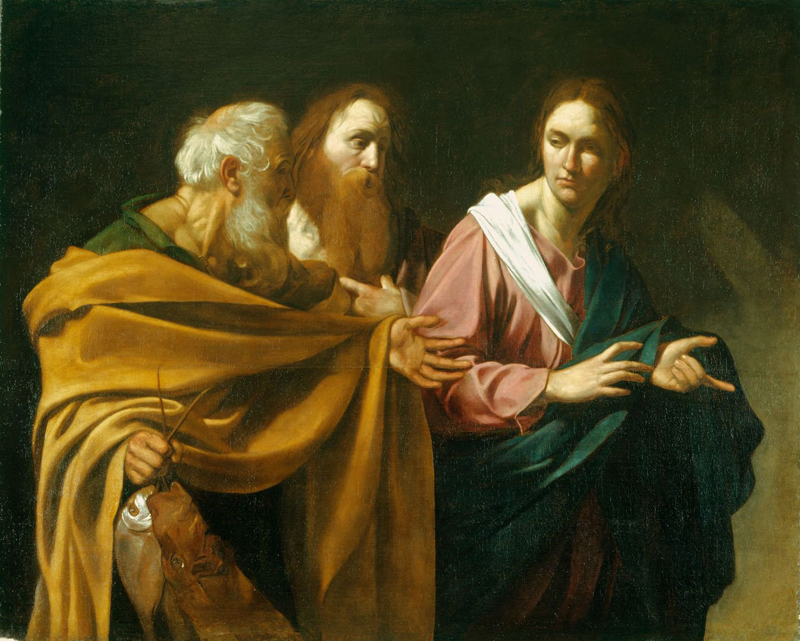and declared, "Here is the Lamb of God
who takes away the sin of the world!
This is he of whom I said, 'After me comes
a man who ranks ahead of me
because he was before me.'
I myself did not know him; but I came
baptizing with water for this reason,
that he might be revealed to Israel."
And John testified, "I saw the Spirit
descending from heaven like a dove,
and it remained on him.
I myself did not know him, but the one
who sent me to baptize with water said to me,
'He on whom you see the Spirit
descend and remain is the one
who baptizes with the Holy Spirit.'

Calling of Saints Peter and Andrew
Michelangelo Merisi da Caravaggio, 1603
The next day John again was standing with two of his disciples,
and as he watched Jesus walk by, he exclaimed, "Look, here is the Lamb of God!"
The two disciples heard him say this, and they followed Jesus.
When Jesus turned and saw them following, he said to them, "What are you looking for?"
They said to him, "Rabbi" (which translated means Teacher), "where are you staying?"
He said to them, "Come and see."
They came and saw where he was staying, and they remained with him that day.
It was about four o'clock in the afternoon.
One of the two who heard John speak and followed him was Andrew, Simon Peter's brother.
He first found his brother Simon and said to him,
"We have found the Messiah" (which is translated Anointed).
He brought Simon to Jesus, who looked at him and said,
"You are Simon son of John. You are to be called Cephas" (which is translated Peter).
Dear friends,
In this passage, John the Baptist presents Jesus as the Lamb of God, one who takes away the sin of the world. This imagery is significant because in many religious traditions, the lamb is a symbol of sacrifice and atonement. Jesus, as the Lamb of God, willingly offered himself as a sacrifice for the salvation of humanity.
But what does it mean for Jesus to take away the sin of the world? It does not mean that we can simply wash our hands of our mistakes and expect all to be forgiven. Rather, it means that through Jesus' sacrifice, we are offered the opportunity to repent, to turn away from our negative actions and towards a path of righteousness. It is through this repentance, through the transformation of our hearts and minds, that we can receive forgiveness and be liberated from the cycle of suffering caused by our negative actions.
The calling of Andrew and Peter brings to mind the first verse of The Foundation of All Perfections:
The very root and basis of the path.
Inspire me to see this clearly
And to make every effort to follow well.
But what does it mean to follow a kind master? It means to listen to their teachings, to put them into practice in our own lives, and to seek to emulate their compassion and understanding. It means to constantly strive to improve ourselves and to cultivate a mind of love and compassion for all beings.
And what does it mean to make every effort to follow well? It means committing ourselves fully to the path of compassion and love that Jesus teaches. It means striving to cultivate a kind and open heart, and working towards the betterment of all beings. By following a kind master and striving to cultivate love and compassion in our own hearts, we lay the foundation for all perfections and create the conditions for a more peaceful and harmonious world.
As we reflect on this passage, let us remember the power of love, compassion and wisdom to transform our lives and the world around us. May we strive to emulate the example of Jesus, the Lamb of God, by offering ourselves in service to others and by seeking to cultivate a heart of compassion and understanding towards all beings.
May we all find the path to true freedom and inner peace.